"I should have known...": Understanding Hindsight Bias in Grief
/ General : Eleanor Haley
For further articles on these topics:
People have a natural tendency to sift through the ashes of tragedy in search of explanations. To quote Holocaust survivor and psychiatrist Viktor E. Frankl:
“Man’s main concern is not to gain pleasure or to avoid pain but rather to see a meaning in his life.”
The search for sense in the seemingly senseless is one of the most instinctual coping skills a person can employ in the face of hardship. The idea that life and death is random creates a dissonance so sharp one simply can’t allow it to linger; so you search… and you sift… and you piece irreparably broken things back together, desperate for it all to make sense.
It's common to ask questions after a loved one dies, because sometimes you want answers. You may look into your memory and ask questions like:
"Why did this happen?"
"How could this have happened?"
"Could I have seen this coming?"
And through a shattered but enlightened lens, you suddenly see the signs. You see things you could have done differently, you see turning points, and you say to yourself:
"I should have done something"
"I should have known."
"I knew."
It may be hard for you to believe because you now know how things turned out, but in the past you really didn't know as much as you think you knew. You may have worried or had your suspicions, but you didn’t know. Or if you knew, the things you think you could have done differently weren’t quite as obvious to you then as they seem now. The reason I know this is because you are looking at things in hindsight, and hindsight is biased.
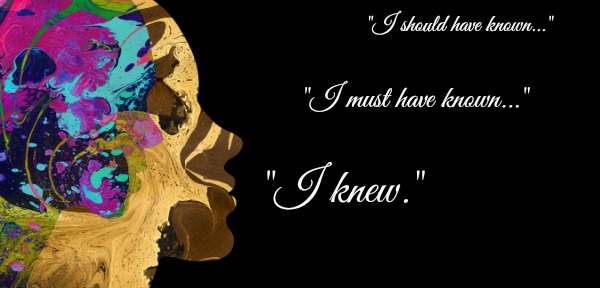
Hindsight bias is a normal and common psychological phenomenon that causes people to believe that outcomes were predictable. When looking at events after the outcome is known, people have a tendency to notice information that is consistent with what they now know to be true. The same tendency causes them to ignore neutral or contradictory evidence, so that when a person goes to piece together a meaningful narrative, as people are wont to do, they often wind up with a story that goes something like "This was the beginning, here were the signs, here’s where things went wrong, and this is the outcome."
For some, it is comforting to create a narrative that brings order to the confusing chaos of death and grief, and many people find reassuring answers to questions like “Why?” “What went wrong?” “Could it have been changed?” and “What could have been done differently?”. Others, on the other hand, are left with a narrative that causes them to feel unpleasant things like guilt, blame, shame, regret, and personal responsibility.
If you're still with me, let's throw one more concept into the mix: In an effort to construct a narrative around one's experiences, people often engage in counterfactual thinking. Counterfactual thinking is thinking things like 'What if?" and "What might have been?". It is the act of coming up with alternative outcomes that are counter to (or different than) the facts. Many times our counterfactual thinking follows an "if-then" pattern. Some examples:
"If I hadn't slept late, I wouldn't have missed the bus."
"If I had gone to that party like I wanted, then I wouldn't have aced my math test."
Researchers Kray et all (2010) note that counterfactual thinking is actually, "an essential feature of healthy cognitive and social functioning and also a ubiquitous part of life." While they acknowledge that this type of thinking can certainly lead to negative thoughts and emotions like guilt and regret, they also suggest that counterfactual thinking can lead to positive emotions like relief and gratitude.
In grief, though, one can see how counterfactual thinking could have negative implications when combined with hindsight bias. Through a narrative constructed using hindsight bias, one can easily see the part they play in various counterfactual realities. Knowing what they know, one might come to believe that if they had been paying attention or if they had acted differently then a better counterfactual reality might actually be the reality. Some examples:
"If I had been paying attention, then I would have noticed that my mother was sick and urged her to go to the doctor."
"If I hadn't gone to work that day, then I would have been home and could have prevented the accident."
"If I hadn't been so caught up in my own life, then I could have gotten him the help he needed."
"If I hadn't left her bedside when I did, then I would have been with her when she died."
So, now that you know how your tricky brain works, some of you may decide to take a step back and reassess your narrative. However, if you still need a little extra help, we've written a few articles that I think may be relevant to anyone struggling with feelings like guilt, regret, and blame.
Guilt and Grief: Coping with the Coulda, Woulda, Shouldas
Subscribe to receive our posts straight to your inbox.
We wrote a book!
After writing online articles for What’s Your Grief
for over a decade, we finally wrote a tangible,
real-life book!
What’s Your Grief? Lists to Help you Through Any Loss is for people experiencing any type of loss. This book discusses some of the most common grief experiences and breaks down psychological concepts to help you understand your thoughts and emotions. It also shares useful coping tools, and helps the reader reflect on their unique relationship with grief and loss.
You can find What’s Your Grief? Lists to Help you Through Any Loss wherever you buy books:
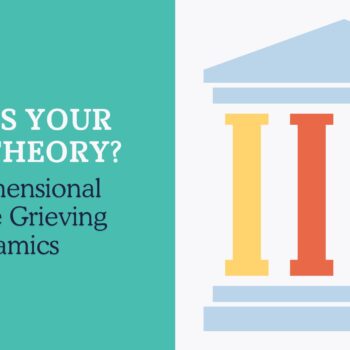
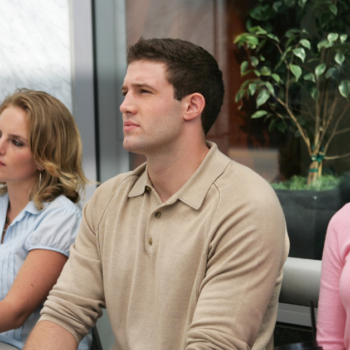
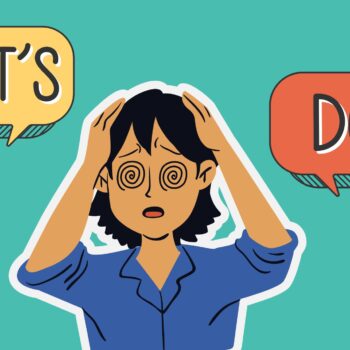

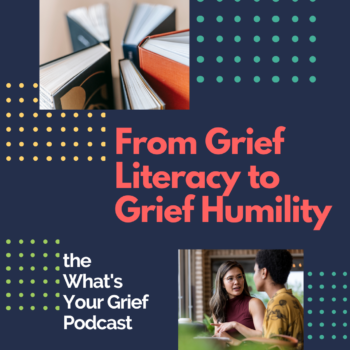
Carolyn February 18, 2018 at 7:14 pm
This article was such a great find because since our 28-year-old son suicided a year ago, my husband and I are both incredibly full of guilt and the shouldas, wouldas and couldas visit us daily. We will never feel we did enough to keep him from an early death, and instead, we feel we added to the hopelessness he felt before he left. We were in such denial when he spoke of suicide. He suffered a mental break and we took him to the hospital where he refused care. The next day I was lucky to get an open appt with a psychiatric nurse practitioner, and was told it was unusual that a canceled appt at that clinic would be exist, giving us that time slot. I thought God was going to move. But I couldn’t get my son to go. I begged, pleaded and tried to physically drag him out of bed to go to that appt. I SHOULD HAVE called my husband or close friend to help me persuade him to go. When he was talking out of his head, I SHOULD HAVE gently suggested we go back to the hospital. Then he seemed to make a turn around. I SHOULD HAVE been suspicious that he would turn around with little sleep and no medical attention. The next morning we had communion together, I prayed through our house, I prayed over my son, I was making breakfast for him. He said ‘I need help’ and what did I do? I agreed that he needed help and prayed for him again. What he didn’t know was I had called every psychiatrist in town to get in for an appt that day. When his dad got home that evening, we were hoping to make a plan together. An hour later, my sister and I heard the pop coming from his room. He had shot himself in the head. I SHOULD HAVE GRABBED HIM AND TAKEN HIM TO THE E.R. I SHOULD HAVE CALLED 9-1-1 and gotten their help to get him to the hospital or gotten his dad to come home and help me get him to the hospital. IF I WOULD HAVE BEEN TUNED INTO HIM CLOSER, I WOULD HAVE realized he never asked for help, that he wasn’t just recognizing he had a problem, he really needed immediate help. Daily, I realize what a failure I am as a mother who always protected my sons , I’m a failure as a human to act instinctively to someone in danger, I can’t trust my judgement now. My husband feels the same. We are still standing, but it’s on wobbly legs. Our church family is there for us, but our shame and regret at letting or son down in his final days is relentless. We are both in counseling, yet we still feel horribly responsible and guilty.
Carolyn February 18, 2018 at 7:14 pm
This article was such a great find because since our 28-year-old son suicided a year ago, my husband and I are both incredibly full of guilt and the shouldas, wouldas and couldas visit us daily. We will never feel we did enough to keep him from an early death, and instead, we feel we added to the hopelessness he felt before he left. We were in such denial when he spoke of suicide. He suffered a mental break and we took him to the hospital where he refused care. The next day I was lucky to get an open appt with a psychiatric nurse practitioner, and was told it was unusual that a canceled appt at that clinic would be exist, giving us that time slot. I thought God was going to move. But I couldn’t get my son to go. I begged, pleaded and tried to physically drag him out of bed to go to that appt. I SHOULD HAVE called my husband or close friend to help me persuade him to go. When he was talking out of his head, I SHOULD HAVE gently suggested we go back to the hospital. Then he seemed to make a turn around. I SHOULD HAVE been suspicious that he would turn around with little sleep and no medical attention. The next morning we had communion together, I prayed through our house, I prayed over my son, I was making breakfast for him. He said ‘I need help’ and what did I do? I agreed that he needed help and prayed for him again. What he didn’t know was I had called every psychiatrist in town to get in for an appt that day. When his dad got home that evening, we were hoping to make a plan together. An hour later, my sister and I heard the pop coming from his room. He had shot himself in the head. I SHOULD HAVE GRABBED HIM AND TAKEN HIM TO THE E.R. I SHOULD HAVE CALLED 9-1-1 and gotten their help to get him to the hospital or gotten his dad to come home and help me get him to the hospital. IF I WOULD HAVE BEEN TUNED INTO HIM CLOSER, I WOULD HAVE realized he never asked for help, that he wasn’t just recognizing he had a problem, he really needed immediate help. Daily, I realize what a failure I am as a mother who always protected my sons , I’m a failure as a human to act instinctively to someone in danger, I can’t trust my judgement now. My husband feels the same. We are still standing, but it’s on wobbly legs. Our church family is there for us, but our shame and regret at letting or son down in his final days is relentless. We are both in counseling, yet we still feel horribly responsible and guilty.
Tamara February 17, 2018 at 6:04 pm
This article found me in one of those moments where I needed it the most. Thank you for reminding me that I did exactly what any other mother in my shoes would have done. And even though it wasn’t enough, without the knowledge of what would come next I could have done nothing more. Darn though, the brain likes to try to convince us otherwise…
Tamara February 17, 2018 at 6:04 pm
This article found me in one of those moments where I needed it the most. Thank you for reminding me that I did exactly what any other mother in my shoes would have done. And even though it wasn’t enough, without the knowledge of what would come next I could have done nothing more. Darn though, the brain likes to try to convince us otherwise…
sandy February 16, 2018 at 5:05 pm
I dropped the ball. I failed my Lydia. she was only 23 when she took her life. I will never forgive myself!
sandy February 16, 2018 at 5:05 pm
I dropped the ball. I failed my Lydia. she was only 23 when she took her life. I will never forgive myself!
Tina Webster April 23, 2017 at 2:56 pm
“Hindsight is a wonderful thing” ( Not ) – It’s a cruel and manipulative bully.
Mona March 5, 2017 at 10:57 pm
My biggest what ifs …. if I had only followed my gut and asked my son what was wrong that last night when he stood in the kitchen in the shadows and didn’t turn on the lights; if only I had told him l loved him one last time that final morning; if only I had noticed that he had given up caring about his weight.
But then I ask myself, Would anything I said have made a difference? It became clear after the fact that he had been planning his death and making his to-do lists. He was determined. But I still wonder…what if?
sue February 28, 2017 at 3:41 pm
my greatest regret is that i was exhausted , over my limit trying to juggle 6 kids as my husband was dying from metastatic lung cancer … the hospice folk tried every which way to get me to stay .. i just couldn’t … he died without me about 6 hours later … it haunts me … it haunts me … it haunts me ….
Kimberly February 21, 2017 at 11:48 am
I find that the what ifs are so paralyzing that they keep me from doing EXACTLY what I need to do , which is be in the moment…be more present, connect, don’t let depression steal hope and joy…
My mom lived with me after the death of her husband. She lived with depression…that I could not understand and that I found myself fighting to keep it out of my home… I could not. I became angry and frustrated with circumstances that I had no control over. In that I stepped back from being responsible for others… as no one else felt the need to be there and I was exhausted. I was encouraged to stop being an enabler.. 2015..my college son had a depressive episode, returned home.. my brother in law,died in motorcycle accident..and my mom was diagnosed with Triple Negative Breast Cancer stage 3..and died in 6 months time. “What if” is the quicksand that I live in everyday.?
Brandy February 20, 2017 at 1:49 am
I can understand how easy it would be to give our minds the power to always think about the what if”s, my mother was crossing the street, she had made it half way when a car hit her, she died 30 minutes later, it was my birthday, but I look at the situation differently because my mother had finally stopped drinking after 22 years of battling that demon she had been sober for 2 months when she died. After she died I found her monthly planner, under each Saturday in Sept and Oct she had wrote ND {no drinking} and a happy face was drawn next to it. Although her death was sudden and I miss her so much, I do not give power to the what if’s because if I did I would have to ask myself what if she lived and could not fight her demon (alcohol)? It is so much more comforting for me to know that she will never have to fight that battle again, it was hell for her, now she has the peace she should’ve had here. The questions that run thru my head are how far did she fly when the car hit her because it knocked off her shoes and a sock and her walkman was located so far from her body that initially the police did not realize it belonged to her, was she in pain, was she aware she was dying, these are the questions that I can not get away from.
Carol February 19, 2017 at 3:03 am
Me too. I am haunted by what I could’ve done to save my dad. I keep replaying the last year of his life. Time went so fast. But I did not recognize he was dying. I thought he was just being a grumpy old man and I took our time together for granted. I was responsible for caring for him. I feel like I failed him. I failed to save him. I regret not being there on the last day of his life. He was alone in the hospital when he died. And all he wanted to do was go home and I didn’t even honor that.
Vivienne February 11, 2017 at 8:48 pm
This is so spot on. It’s been two years since I lost my dad after 3 years of illness without diagnosis. I have four big “if I had” issues. If I had been around more, I’d have noticed sooner he was sick. If I had fought the Dr’s more we would have had a diagnosis sooner which might have helped his quality of life. If I had paid attention more, I would have realised how close to the end we were at Christmas and made the effort to go down for his birthday in January. And the biggest, If I had only not gone for a sleep (after 3 days and nights in a chair by his bed) or at least if I had got up at 9am when my alarm went off and gone back to the hospital, I would have been there when he died.
Two years later and I’m still haunted by these.
Janet February 11, 2017 at 1:35 am
Brilliant article, I can identify with all that is said.
Doug Ebbert February 9, 2017 at 5:35 pm
This articulates exactly what I’ve lived with every day for that past three years since losing my only son. Knowing that there was a way that he could have survived will always haunt me. Thanks Eleanor
Suzanne February 11, 2017 at 6:32 am
Gloria
My feelings exactly
My son had emotional issues and serious drug addictions
I took him seriously for 14 years but he survived all of it so at the end I thought it was just another time and I backed off
From “fixing” him..to let him work on himself
Well that time was not another round of survival for him
But how are we as parents to know that when they keep dodging that bullet that there will be a day they don’t?
Hindsight I felt that I should have known
But I remind myself that had I known then he would lose one last attempt at getting high
I didn’t know what I didn’t know as the saying goes
I’m heartbroken but being gentle with myself because I know I would have stepped in had I known he was in such bad shape at the end
gloria February 9, 2017 at 4:54 pm
Oh yes, this is a biggy, and so very hard to get past, the coulda, woulda, shouldas. I am not sure I will ever. My daughter, Laura, (28yo) struggled for 10 years with her diabetes, eating disorder, and alcohol. After 19 months now, I now feel like I did not take her issues serious enough. What was I thinking? I know what I was thinking. That she would be okay. Because she always recovered from whatever. Except she didn’t, and my sweet girl is no longer here. Thank you Ladies, for this article, time for me to go back and read some of the past excellent articles on this topic.
On another note, I got my first tattoo, it’s for Laura! It’s her signature with a tiny cardinal, on my wrist! ♥ I love it and it makes me so happy to look at her writing, on me, every day! Maybe a topic for the future. 🙂 ♥
Karen February 17, 2018 at 3:11 pm
Gloria, I lost my oldest son two years ago in January. I also want to have his signature tattooed on my wrist. He would write his name over and over when he was growing up. Such a precious gift to see everyday. Can you share with me how you found your tattoo artist and which city you are in. I thank you in advance for your help.